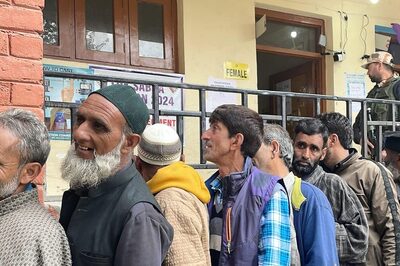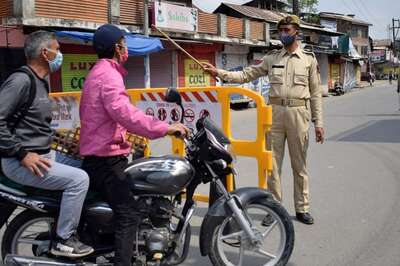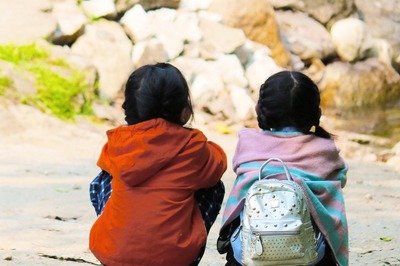
views
"I will never forget the look in the eyes of these people when I asked them for money. I'm still burning with shame," said Pawan, pointing at the large, expensive houses in front of us. He was sweeping a road of a posh colony with his wife, Seema. Only Pawan is employed as a sanitation worker by a Delhi municipality. But Seema also works with him because, she says, the area that Pawan has been given to clean is too big for one person. So, two people work on one person's salary. And Pawan hadn't been paid for the last three months.
Seema had also asked someone here for money. "I told a woman here to loan me a small amount because we haven’t been paid our salaries. She said 'you're lying'. I asked her to call my office and check. But she wouldn't listen to me. She slammed the door in my face."
When News18 met them on Wednesday, both Pawan and Seema were in a desperate state. They had no money to buy essentials like milk for their children or medicines for Pawan's mother. And they had already borrowed a lot from local loan sharks at 10% interest. They had borrowed so much that even if Pawan was given all his pending salaries, he would still not be able to break even.
They were broke despite performing a job that must surely rank among the most dangerous in the country today: collecting and disposing garbage, knowing fully well that they could, at any time, come in contact with trash contaminated by the novel coronavirus which has claimed 2,30,000 lives across the world and over 1,000 lives in India. And they pick the trash up daily with bare hands. Seema says a month ago they were given two pairs of used gloves. "But we did not put them on. God knows who wore them. What disease they had."
Early on during the lockdown, many sanitation workers were showered with flowers by the public. Some videos of them being garlanded also did the rounds on social media. "Maan samman achhi cheez hoti hai sir, lekin usse pet nahi bharta (Being honoured is good, but it doesn't fill empty bellies)," Pawan said.
On Wednesday evening, Pawan called. He had received a message from his office. He could go and collect one month’s salary from the bank the next day. Pawan was delighted. A month's salary was better than nothing.
Both were back on the road with their brooms at 8 in the morning on Thursday. Seema looked happy, buoyed by the previous night’s message.
As we slowly walked along the road, past luxury SUVs, Seema showed a home whose entrance was barricaded. "In this house they found a coronavirus positive person a few days ago. Do you see any dust or garbage around it? No, right? That's because my husband and I sweep this stretch of the road just as we sweep the rest of it. Nobody makes any concessions for us. That's how it is," Seema said, pointing to the house.
Except for the obviously high risks that now come with the job, has the work become easier with people confined to their homes?
"It's become both better and worse. Better in that we don't have to pick up rubbish like wrappers or fruit skins that people throw on the road while moving about. But it's become bad because people don’t even bother placing garbage outside their buildings. They throw their garbage bags from their windows every day, not realising the mess that's made on the ground below. And with the thick carpet of dried leaves these days, we're working double shifts," Pawan said.
He used to work in Karol Bagh earlier. Before he was transferred here, for 20 years, he says, he literally picked up shit with his hands. "I used to in knee-deep excrement almost every day. Smelled of it. It's equally bad at the place where we live. But you know the difference is that people who live here are more important. They have better drains and all but they produce no less garbage than we do. The thing is, here people can call up our office the moment they see a dog defaecating. We have to come clean it up. Back where we live, it's not a big deal."
It's around 8.30 am now. Apart from these two there is still nobody out on the road. The only sign of life in the houses around is the devotional music flowing out of them. An old woman steps out with her husband to catch a breath of air. Seema wishes her a good morning and in response to a casual enquiry tells her that she's in a bad way financially. The woman waves back at Seema and steps back in the house. "I've been picking up her garbage for four months now. I know her well. Now she's pretending to be hard of hearing," Seema said.
Seema could have also earned a steady salary working in these houses. Only, Pawan wouldn't allow her to work as a maid. "We are poor people but we have our dignity. I know how it is with them. One misplaced item and they'll accuse you of theft. They did it to my aunt once. A rich woman lost her necklace and she blamed it on my aunt. Three days later those people found it in her wardrobe. She'd put it there and forgotten," Pawan said. After a moment he added, "I have three children and I've never been able to afford Bournvita for them. That I can live with. Someone accusing us of being thieves, I cannot."
Pawan feels the pinch of poverty but he has hopes in the Prime Minister. "The number of times Modi has talked about safai karmacharis, nobody before him has. He has lived through poverty. He knows what it is like. I'm sure he's trying to do everything for people like us.” He says that if he ever gets to meet Narendra Modi he’ll make a request on behalf of all his fellow sanitation workers: “Please pay us our salaries on time. We'll do whatever it takes. But please don't leave us hanging like this."
It was around 10 now. They were almost finished with the road. What remained was garbage strewn in the narrow alleys. Seema had gathered together the last heap of dried leaves, when a car sped past and blew it up. "Aaj jaldi haath maarna padega. Bank sirf 2 baje tak khulenge (Today we'll have to finish work quickly. Banks will be open only till 2 pm)," Pawan said to his wife, reminding her about the salary they had to collect, as they began putting together that heap again.
(The names of both the sanitation workers have been changed at their request.)




















Comments
0 comment